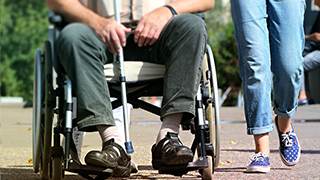Another bid to legalise assisted suicide

A man is seeking permission to bring the first High Court challenge to assisted suicide law, since the defeat of Rob Marris' bill to legalise it in 2015.
Noel Conway, 67, was diagnosed with Motor Neurone Disease (MND) in 2014. He wants a doctor to be allowed to prescribe him a lethal dose when his health deteriorates.
Mr Conway is being backed in his legal bid by assisted suicide campaigning group, Dignity in Dying.
At the same time, Christian Legal Centre clients Merv and Nikki Kenward are back in court next week to challenge the liberalisation of assisted suicide prosecution policy.
Changing law would be 'highly dangerous'
Mr Conway told the BBC that he had been given a life expectancy of less than 12 months. He said he had considered travelling to the Dignitas clinic in Switzerland, but was concerned that when he feels ready to die he might be too ill to travel.
"I fear I will reach a stage where I am entombed in my own body as my ability to move gradually reduces - that would be unimaginable," he said.
"I have a right to determine how and when I die and I want to do so when I have a degree of dignity remaining to me."
He added: "As someone who has always been in control of his life and taken responsibility for himself, I find this quite unacceptable. I want to change the law to allow assisted dying so that I can be in control of my own death."
But disability rights campaigner Baroness Campbell says that changing the current law would be "highly dangerous".
Baroness Campbell has spinal muscular atrophy and founded the organisation Not Dead Yet, which campaigned against Rob Marris' bill. She uses a powered wheelchair and is fed through a tube.
She believes that every life is valuable and should be protected.
"If the law was changed it would feed into society's fear that being very disabled like me is a state worse than death," she explained.
"We already have to fight to live; a right to die would be a huge and frightening burden."
Challenge to prosecution policy
As Mr Conway seeks to liberalise the law, Christian Legal Centre clients Merv and Nikki Kenward are fighting to protect the most vulnerable in our society.
Nikki Kenward was left paralysed in 1990, at the age of 37, by Guillain-Barre Syndrome, and for several months was only able to wink her right eye. Now, she remains wheel-chair bound and cannot hold a needle or tie her shoe-laces.
Despite this, Mrs Kenward strongly opposes any liberalisation of assisted suicide law.
In England and Wales, the Director of Public Prosecutions (DPP) first published an assisted suicide prosecution policy in 2010, following a Law Lords' ruling.
The DPP claimed to have 'clarified' the policy when she made an amendment to the guidelines in October 2014, without public consultation. The change means that healthcare professionals who help someone to kill themselves are less likely to be prosecuted.
Nikki and Merv have mounted a legal challenge to the change, which they believe is "liberalisation by the back-door".
'People at risk from dodgy doctors'
"It may appear a subtle change, but it is substantive and highly significant. It makes it less likely that doctors and other healthcare workers will be prosecuted if they encourage or assist suicide," Nikki explained.
"People need to be able to trust that doctors will always protect life, not help to take it. This change undermines that trust. It is liberalisation by the back-door.
"The law is there to protect, but if it is to protect in practice, it must be enforced. The DPP quietly changed the policy without consultation. She must be held to account. Her action puts vulnerable people at risk from dodgy doctors."
What is the law and what is Mr Conway challenging?
In September 2015, a vote to legalise doctor-assisted suicide in the UK was roundly rejected by MPs, following a campaign by Christian Concern and other groups. This was the seventh attempt to change the law in ten years.
Despite this, campaigners continue to look to change the law in other ways. One way of doing this is to change the way that laws are applied through the courts.
Mr Conway is seeking a judicial review of the 1961 Suicide Act, which states that assisting in a suicide is a criminal offence, punishable by up to 14 years in prison.
His lawyers will argue that this is incompatible with Article 8 of the Human Rights Act 1998, which protects the right to privacy and family life.
The case is expected to be heard at the High Court in the next few months.
Please pray for the Kenwards, who are back in court on 17 January for a permission hearing at the Court of Appeal.
Related links:
'I fear being entombed in my body' - suicide legal challenge (BBC)
Terminally ill UK man launches legal challenge for right to die (Guardian)
MPs overwhelmingly reject death bill
Disability campaigners to appeal High Court ruling on DPP's assisted suicide policy
